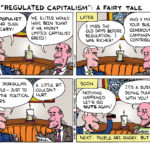regulation
"The damage that private equity has wrought on Americans' healthcare from cradle to grave, simply for profit, has become a life-or-death situation."
The post ‘Shocking and Immoral’: Report Details Private Equity’s Stranglehold on US Healthcare appeared first on scheerpost.com.
By Dean Baker / Beat the Press (CEPR) An item in Ezra Klein’s NYT column yesterday really grabbed by attention. Ezra cited a Wall Street Journal column that claimed that the Federal Reserve Board’s stress tests would not have detected Silicon Valley Bank’s (SVB) problems, because its stress tests did not consider interest rate risk. This struck me as […]
The post ‘Regulation’ Is Not a Mantra appeared first on scheerpost.com.
Capitalism is corrupt, but its defenders say it can be regulated to become less savage. History shows that the tendency of power and money to aggregate and be monopolized in fewer hands makes the dream of regulated capitalism impossible.
The post “Regulated Capitalism”: a Fairy Tale first appeared on Ted Rall's Rallblog.Is Crypto Really Going To Crash? (Yes)
Crypto is going to crash and could take your savings with it.
